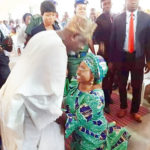Toyib Aremu is one of the three Nigerian students studying at the Mohammed VI Polytechnic University in Benguerir, Morocco. He shares with NURUDEEN ALIMI his experience in Morocco and how he plans to return to Nigeria to bring his expertise to bear on the development of agriculture in Africa and Nigeria.
Could you please give detailed information about yourself?
My name is Toyib Aremu. I am from Ibadan, Oyo state and I am currently studying alongside two other Nigerians at the Mohammed VI Polytechnic University in Benguerir, Morocco. Before coming to Morocco, I had just finished a master’s degree in Sustainable Development at the University of Ibadan and was volunteering on a livelihood project with Voluntary Service Overseas in Niger State. All my education before now had been in Ibadan. I am very passionate about agriculture and food security and this has formed the basis of coming to UM6P to study. I hope to contribute to Nigeria and Africa’s efforts to achieve food security and zero hunger.
#PMBInJapan: Buhari arrives for 7th Tokyo International Conference in…
How did you gain admission into Mohammed VI Polytechnic University, how long have you been in the school and how would you describe your experience so far?
Towards the end of my master’s programme in Sustainable Development, I was very clear on the fact that I wanted a place in the agriculture sector. I knew that agriculture will play a vital role in Nigeria’s development. I told myself that I needed more academic exposure in the area. I said to myself that I will not go on to a doctorate programme without the first understanding of basics in agriculture. So, I started searching for opportunities. After applying to this Master, I got an email from Professor Bekkaoui, Director of the School of Agriculture, Fertilisation and Environmental Sciences, that I will be having an interview. Quite funny I was reading big on fertilisers and current trends in the industry. However, on the interview day, I was being asked about the basics of chemistry and biology. After some time, I was contacted by the school again, but this time with a phone call: I had been offered a 50% scholarship. I asked how much I had to pay to cover the rest and it was summing up to about USD 7,000. That was not the first time a school would call and say I had been given admission so I have kind of mastered how to tell them I was hoping for a full scholarship. Later I was mailed some documents to fill to apply for a supplementary scholarship that would clear the rest of the costs. Long story short, I got my tuition, feeding, accommodation and registration fees covered. But I still had to cover my visa and flight fees. It was a very short notice but with the help of friends and well-wishers, I was able to crowd-source this.
It has been about five months now and I can boldly say the experience has been really good. The school brings international professors and industry experts to teach. As a student, you have a room to yourself: your own closet and toilet. You are not sharing a bunk with anybody and you don’t need to worry about making your bed or cleaning your room. You have virtually unlimited access to the internet. Truth is, all the time I was applying to schools abroad, Morocco did not even cross my mind. It was always Europe. But I can say now that what you are going for in Europe is here in Morocco. UM6P is a world-class institution. Also, studying with other students from other African countries like Kenya, Egypt, Uganda, Malawi, Liberia, Rwanda and Morocco gives one an exposure to the culture of other people.
How would you describe tertiary education system in Morocco compared to what obtains in Nigeria?
I can only speak about UM6P where I am studying. For starters, there is no industrial action here like in Nigeria. Since I came here, I doubt if the electricity as gone for a minute. So someone working in a lab would not have to worry about the power supply. When I first came here, one of my professors said something to me that still resonates: “Toyib, we are not here to fail you. If you have the marks, we will give it to you.” He said this when I asked him why he had collected the rough work paper alongside the answer sheet. He made me understand that it is possible for a student to incorrectly transfer his answers from the rough sheet to the answer sheet so he would look through everything. I was really glad when he said this as that means there is no ‘A is for God, B is for me’ here. The grading system is 20 here. All your courses are scored over 20. I have not heard about a system of marking like this here: it is still strange to me.
For me, UM6P, being funded by the state-owned OCP provides an example for Nigeria in terms of quality at the tertiary education level. Although NNPC in Nigeria is currently sponsoring students abroad, I am looking forward to a time when it will invest in our local institutions.
Are you being given equal treatment like other students from Morocco and other countries considering the fact that you are a Nigerian?
This is an international institution. Everyone goes about their thing without fear or unequal treatment. I don’t think I have experienced any unfear treatment from anyone here because I am a Nigerian.
After your graduation, do you intend to stay back in Morocco to work or you will return to Nigeria to bring your expertise in fertiliser science to the agriculture sector?
My long term goal is to work in an agricultural research or policy platform. I am currently not considering staying back in Morocco. What I am considering however is to further my education and get a doctorate. So, yes, I will return to Nigeria to apply whatever skills I may have learned in the process of this Master or any other valuable experience associated with it.





